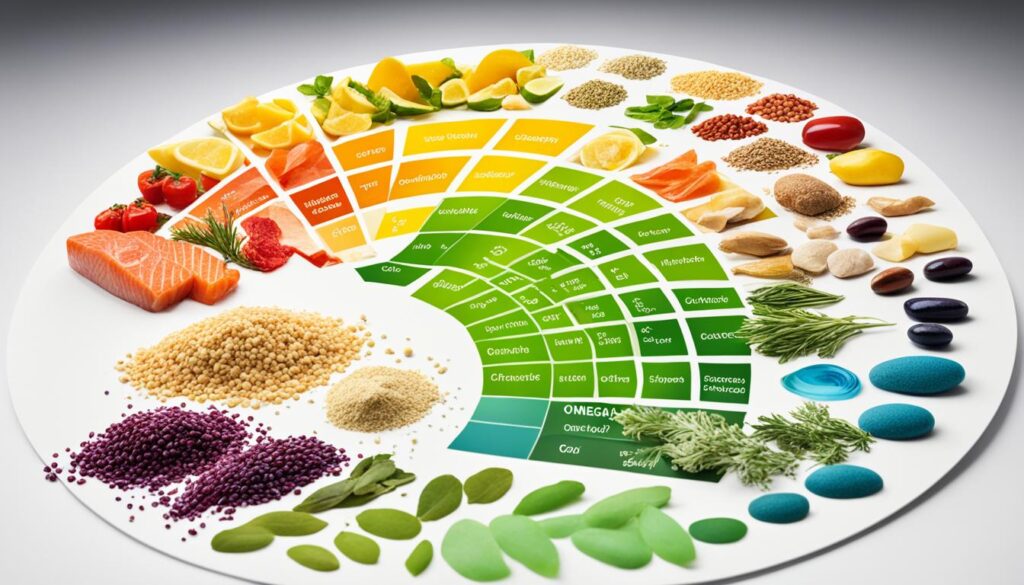Did you know omega-3 fatty acids are key for staying healthy? These important fats are essential for our health especially for our heart and brain.
But, it’s vital to understand why they matter and how to make sure we get enough. Explore omega-3s’ benefits and see why they’re crucial every day.
Key Takeaways
- Omega-3 fatty acids are essential nutrients that the body cannot produce on its own.
- The three main types of omega-3s are EPA, DHA, and ALA, each with unique benefits1.
- Omega-3s support cardiovascular health, brain function, and have anti-inflammatory properties.
- Omega-3s can be obtained from both marine and plant-based sources, with fish and seafood being the richest sources2.
- Recommended intake varies by age and gender with the American Heart Association providing guidelines for heart health.
What are Omega-3 Fatty Acids?
Omega-3 fatty acids are essential fats for the body’s health. There are three main types: ALA DHA, and EPA. ALA is from plants, while DHA and EPA come from animal sources such as fatty fish and algae.
Types of Omega-3 Fatty Acids
The key omega-3 fatty acids include ALA, DHA, and EPA. ALA is very common in the Western diet and found in plant oils, nuts, and greens. DHA and EPA are vital for health especially for the heart and endocrine systems.
Importance of Omega-3s in the Body
Omega-3s are essential for body functions. They help make up cell membranes and support brain and eye health. Omega-3s also help the heart control inflammation, and ensure well-being.
| Omega-3 Fatty Acid | Primary Sources | Key Functions |
|---|---|---|
| ALA Alpha-Linolenic Acid | Plant oils, nuts, seeds | Cardiovascular health, modest anti-inflammatory effects |
| EPA Eicosapentaenoic Acid | Fatty fish, fish oil | Anti-inflammatory, cardiovascular health |
| DHA Docosahexaenoic Acid | Fatty fish, algae | Brain and eye health, fetal development |

Omega-3 fatty acids are essential for human physiology and play vital roles in the cardiovascular endocrine, and nervous systems.
Cardiovascular Benefits of Omega-3 Fatty Acids
Omega-3 fatty acids are great for fighting heart disease. They offer many health benefits for your heart. This makes them a key part of a diet that’s good for your heart.
Omega-3s help lower triglycerides, which is important for heart health. They also raise your HDL cholesterol which is the good kind. This improves your overall cholesterol levels.
They also help control your blood pressure. Even though the effects aren’t huge, they are still very positive for your heart’s health8.
Omega-3s lower your chances of getting heart disease. They also cut the risk of dying from heart disease suddenly. The American Heart Association says they are key to preventing heart problems. So, keeping them in your diet is very important for a healthy heart.
| Cardiovascular Benefit | Omega-3 Fatty Acid Effect |
|---|---|
| Triglyceride levels | Reduction |
| HDL good cholesterol | Increase |
| Blood pressure | Modest decrease |
| Cardiovascular disease risk | Reduction |
| Sudden cardiac death | Reduction |
| Blood clot formation | Reduction |
Adding omega-3 to your diet helps keep your heart healthy. If you have heart issues, omega-3s are even more important. They’re a strong way to care for your heart.

Eating more foods rich in omega-3 is great for your heart. It’s an easy and powerful choice for heart health .
Omega-3 Fatty Acids and Brain Health
Omega-3 fatty acids, mainly DHA, are super important for our brains at every life stage. They are essential during pregnancy for the fetal brain’s right growth and the nervous system. Pregnant women who eat fish or take fish oil give birth to children with better brain power.
Role in Prenatal Development
Getting enough omega-3 when pregnant and in early life can boost thinking skills later on. Giving DHA to newborn piglets made them smarter and changed their brain activity. Also, kids who took omega-3 in their first years did better in school later on.
Cognitive Performance and Aging
As we get older, omega-3, especially DHA, might help our brains stay sharp and slow down aging. Those with less DHA as they get older have smaller brains and see their brains age faster. Plus, fish oil might make our brains work better as we get older, but not for people with Alzheimer’s.
Watching people who eat fish rich in omega-3, we find they have better brains. But, taking fish oil doesn’t seem to make healthy people smarter if they don’t have memory problems. This means eating foods rich in omega-3, like fatty fish, is good for our brains12.
| Findings | Study | Citation |
|---|---|---|
| Perinatal DHA supplementation improved cognition and altered brain functional organization in piglets. | Fang X et al., 2020 | |
| Omega-3 supplementation during the first 5 years of life positively impacted later academic performance. | Brew BK et al., 2015 | |
| DHA-rich fish oil altered the cerebral hemodynamic response to cognitive tasks in healthy young adults. | Jackson PA et al., 2012 | |
| Long-chain omega-3 fatty acids improved brain function and structure in older adults. | Witte AV et al., 2014 | |
| Omega-3 supplementation improved cognition and modified brain activation in young adults. | Bauer I et al., 2014 | |
| Omega-3 supplementation was associated with improvements in memory functions in healthy older adults. | Külzow N et al., 2016 |
In conclusion, omega-3, especially DHA, is key to keeping our brain healthy from before birth until old age.
Anti Inflammatory Properties of Omega-3 Fatty Acids
Omega-3 fatty acids are present in fish and fish oil. They have strong anti-inflammatory effects. These fats help control the body’s inflammation. This can reduce symptoms and slow disease in illnesses like rheumatoid arthritis and Crohn’s.
Potential Benefits for Autoimmune Diseases
When omega-3s are added to lymphocytes, it changes their function. This makes them produce less of the substances that cause inflammation. For example, omega-3s lower the production of prostaglandins. This means less inflammation in diseases.
In 2021, a review of 70 studies showed that fish oil helps rheumatoid arthritis. It lowers pain and stiffness. Heavier doses of fish oil work better. They reduce inflammation and disease for about eight months.
Omega-3s also help with other autoimmune diseases. A big study from 2020 found fish oil supplements reduce heart disease and death. Especially for people with high blood pressure. Another study in the U.K. shows eating oily fish cuts down diabetes risk. Fish oil supplements also lower the risk.

We’re still learning how omega-3s fight inflammation. But, it seems they stop the harmful molecules that start inflammation. They help the body’s natural anti-inflammatory processes. So, omega-3s could be a great, natural way to help with autoimmune diseases.
Omega-3 fatty acids have been shown to exert anti-inflammatory effects through various mechanisms, making them a promising natural intervention for autoimmune conditions. Dr. Sarah Johnson, Nutritionist
Before taking omega-3 supplements, it’s wise to talk to a doctor. They can advise on the best use. Omega-3 from food or supplements is a useful part of managing autoimmune illnesses.
Sources of Omega-3 Fatty Acids
Omega-3 fatty acids are found in both fish and plants. They are key for our health. They help our hearts, brains, and fight inflammation. This makes them crucial for staying healthy.
Fish and Seafood Sources
EPA and DHA, two key omega-3s, are rich in fatty fish and seafood. For instance, mackerel has 4,580 mg of these fats in a 3.5-ounce serving. Salmon offers 2,150 mg in the same size. Cod liver oil is also great, with 2,438 mg per serving. Herring, oysters, and anchovies are solid picks as well.
Plant-Based Sources
If you don’t eat fish, plants offer ALA, a shorter-chain omega-3. Flaxseed, chia seeds, walnuts, and certain oils are good sources. Though body converts some ALA, it’s not much. About 15% turns into EPA and DHA. So, plant omega-3s might not be as effective for our health as marine sources.
| Food Source | Omega-3 Content |
|---|---|
| Mackerel | 4,580 mg of EPA and DHA per serving (3.5 oz or 100 g) |
| Salmon | 2,150 mg of EPA and DHA per serving (3.5 oz or 100 g) |
| Cod Liver Oil | 2,438 mg of EPA and DHA per serving |
| Herring | 2,150 mg of EPA and DHA per serving |
| Oysters | 329 mg of EPA and DHA per serving |
| Sardines | 1,463 mg of EPA and DHA per serving |
| Anchovies | 411 mg of EPA and DHA per serving |
| Caviar | 1,046 mg of EPA and DHA per serving |
| Flaxseed | 2,350 mg of ALA per serving |
| Chia Seeds | 5,050 mg of ALA per serving |
| Walnuts | 2,570 mg of ALA per serving |
| Soybeans | 670 mg of ALA per serving |
Eating a mix of omega-3-rich foods can help you hit the daily goal. For EPA and DHA, aim for 250-500 mg. If you’re a person assigned male at birth, get 1,600 mg of ALA. Those assigned female at birth should aim for 1,100 mg.

The richest dietary sources of the long-chain omega-3s, EPA and DHA, are found in fatty fish and seafood.
Omega-3 Fatty Acids Supplementation
Not getting enough omega-3 from food? You might consider taking supplements. These come in types like fish, krill, cod liver, and algal which is vegetarian . Each type has different quantities of EPA and DHA, the important omega-3s. Talk to a doctor before you start, to make sure you choose the right type and amount.
Types of Supplements
- Fish Oil: Fish oil comes from fish like salmon, mackerel, and sardines. It’s packed with EPA and DHA.
- Krill Oil:
- is from tiny sea creatures. It might be better absorbed and have more inflammation fighting abilities than fish oil.
- Cod Liver Oil: This supplement has omega-3s plus vitamins A and D. It’s made from cod livers.
- Algal Oil: Made from certain algae, this option is great for people who don’t eat animal products. It’s plant-based and full of omega-3s.
| Supplement | Primary Omega-3s | Other Nutrients |
|---|---|---|
| Fish Oil | EPA, DHA | – |
| Krill Oil | EPA, DHA | Phospholipids, Astaxanthin |
| Cod Liver Oil | EPA, DHA | Vitamins A and D |
| Algal Oil | DHA | – |

Choosing the right omega-3 is important. Look at where it comes from, how much EPA and DHA it has, and what other nutrients are inside. A health professional can guide you, ensuring you pick the right supplement for your health needs.
Omega-3 fatty acids are essential for human health, and supplementation can be beneficial for those who do not consume adequate amounts from their diet.
Recommended Intake of Omega-3 Fatty Acids
Finding the right amount of omega-3s can be tricky. It depends on age, health, and needs. For adults, getting 250–500 mg of EPA and DHA each day is advised. Men should aim for 1.6 grams daily of shorter-chain omega-3 ALA, while women need 1.1 grams.
If you have certain health problems, you might need more omega-3s. The AHA recommends 1,000 mg daily for heart disease patients. For those with high triglycerides, 4,000 mg daily is okay. The FDA and EFSA say up to 5,000 mg daily is safe in supplements.
Special advice is for pregnant and nursing mothers. They should take another 200–300 mg of DHA daily. Plus, eat fish or shellfish for eight to twelve ounces each week. Avoid bigger fish like swordfish due to more mercury.
Checking EPA and DHA levels in supplements is key. Stick to under 5,000 mg per day, following your product’s directions, is crucial.

The best ratio of omega-6 to omega-3 is 2:1. Yet, we usually get ten times more omega-6s. Adjusting what you eat and taking supplements can help. Aim for a 2:1 balance to enjoy omega-3 benefits.
Potential Risks and Side Effects
Omega-3 fatty acids can be safe but taking too much is a risk. This is especially true with supplements. If you take more than 3 grams a day, you might bleed more if you’re on anticoagulant drugs. Some studies suggest omega-3 pills may slightly raise the risk of atrial fibrillation.
Some fish have high mercury. This includes types like tuna. Mercury is bad for pregnant women and kids22. Always talk to a doctor before starting omega-3 pills.
The FDA gave the okay to two omega-3 fatty acid meds for high triglycerides and to lower heart issue risks23. But, mixing statins with DHA omega-3s might up your LDL cholesterol. Doctors should think about going with EPA-based ones like icosapent ethyl instead.
Studies show eating fish oil twice a week can lower heart disease death risks. Yet, fish oil supplements don’t seem to help your heart much. They might leave a fishy taste in your mouth and bad breath. Heartburn, nausea, and diarrhea are also possible. In some cases, they could lead to more bleeding and maybe even a higher stroke risk.

To sum up, omega-3 fatty acids are good for you. But, you should know the possible risks. This is more crucial with big doses or if you’re on certain drugs. Always get your doctor’s advice about using omega-3s.
Conclusion
The evidence is clear – omega-3 fatty acids are crucial for our health. They help our heart and brain work better. They also fight inflammation, making us healthier overall.
The main sources of omega-3 fatty acids are fish and seafood. But, there are also choices for vegetarians and vegans. Adding these foods to our meals or using omega-3 supplements is a good idea. It ensures we get enough for maximum health benefits.
Discovering the many perks of omega-3 fatty acids shows how important they are. With smart food choices and maybe some supplements, we can use the power of omega-3s. This sets us on a path to a brighter, healthier future.





